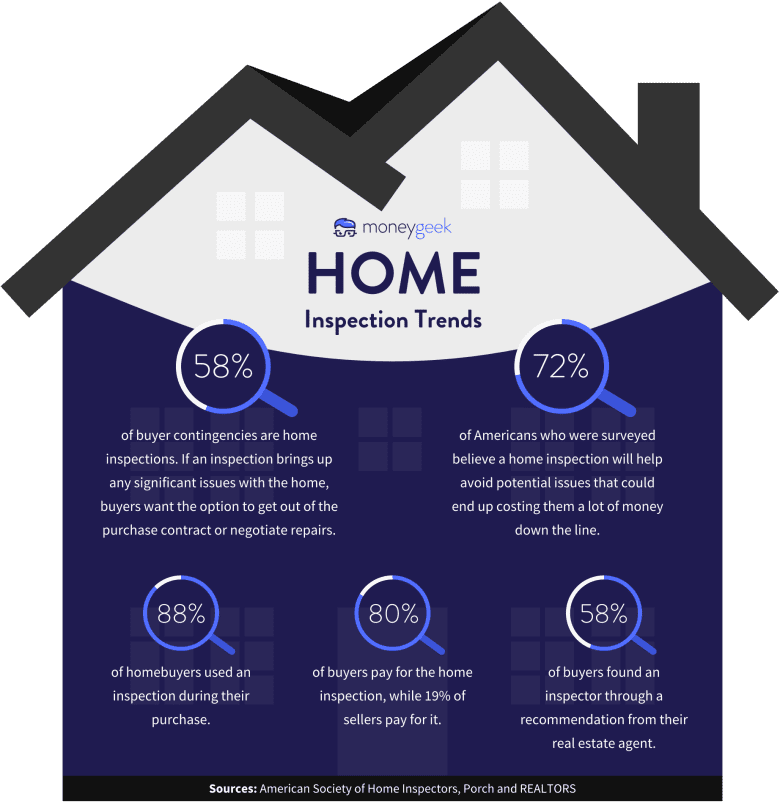Pick Quality and Information with Specialist Home Inspection Lockhart Providers
What to Get Out Of Home Assessment: an In-depth List and Its Significance
Understanding what to anticipate from a home inspection is crucial for both buyers and vendors in the actual estate market. A complete inspection supplies a thorough checklist that analyzes key elements such as architectural integrity, major systems, and total residential or commercial property problem.

Relevance of Home Inspections
The importance of home inspections can not be overstated, as they function as a vital safeguard for both purchasers and vendors in the property market. For purchasers, a home assessment gives an objective evaluation of the property's condition, exposing possible issues that might not show up throughout a casual walkthrough. This procedure assists purchasers make educated choices and negotiate repairs or price adjustments prior to closing, ultimately securing their financial investment.
Alternatively, sellers can profit from home examinations by resolving problems proactively before noting their property. This can improve the home's marketability and possibly accelerate the sales process. A pre-listing inspection can also impart self-confidence in possible customers, as it demonstrates transparency and a dedication to keeping the residential or commercial property.
Moreover, home inspections add to the general safety and habitability of homes. By identifying structural, electrical, or pipes problems, they make certain that homes abide by safety and security criteria and laws. This not only shields the residents yet also supports the stability of the property market. In recap, home inspections are an important element of real estate transactions, providing essential understandings that promote trust fund and openness amongst all events entailed.
Trick Elements of the Checklist
An extensive home evaluation list encompasses several essential parts that ensure a complete assessment of a property's problem. The very first part is the architectural honesty, which includes the evaluation of the structure, wall surfaces, and roofing system for any type of signs of damage or damage. Next off, the list addresses major systems such as plumbing, electric, and cooling and heating, examining their capability and safety and security.
One more critical area is the exterior of the home, which includes examining house siding, windows, doors, and roofing products for wear and prospective leakages. The checklist additionally covers indoor elements, consisting of flooring, walls, ceilings, and insulation, to identify any issues that might affect comfort or safety and security.
Additionally, the list often consists of an assessment of devices, guaranteeing they remain in great working order. Finally, the inspection needs to analyze outdoor areas, consisting of decks, driveways, and outdoor patios, to examine their condition and safety and security. Each of these elements plays a crucial role in offering a comprehensive understanding of the property, eventually assisting possible customers in making informed choices concerning their investment.
Typical Concerns Located
Frequently, home assessments expose a variety of problems that can range from small repair work to considerable safety and security worries. One prevalent concern is the presence of water damage, commonly originating from dripping roofs, pipes failures, or insufficient drain systems. Such damages can cause mold and mildew development, which positions health dangers and may require extensive removal.

An additional usual finding includes electrical systems. Out-of-date circuitry, overloaded circuits, or inappropriate grounding can create fire hazards and necessitate instant interest. In addition, issues with HVAC systems, such as inadequate maintenance or age-related inadequacies, can impact convenience and power prices.
Structural issues like fractured structures or jeopardized framework are likewise regularly kept in mind. These concerns can result in serious repercussions otherwise addressed quickly. Bugs such as termites or rodents might be found, indicating the possibility for significant residential property damages.
Last but not least, the condition of windows and doors frequently comes under analysis. Poor seals can result in energy loss, while damaged structures or glass can affect safety and aesthetics. Determining these usual concerns throughout a home inspection is important for notified decision-making and ensuring the security and long life of the property.
Getting Ready For the Inspection
Preparation is important for a successful home assessment, making certain that both sellers and customers can browse the procedure with confidence. Begin by setting up the evaluation at a mutually practical time, permitting appropriate access to the residential or commercial property. For sellers, it is a good idea to declutter and clean up the home thoroughly, as a neat environment can favorably affect the assessor's evaluation.

For buyers, preparing entails compiling a checklist of specific concerns or locations of rate of interest to go over with the examiner. It is useful to come with the assessor throughout the walkthrough, as this provides direct understanding into the residential property's problem. Ensuring that all energies are operational can help the inspector more helpful hints in performing a detailed evaluation. By taking these primary steps, both celebrations can establish the stage for a reliable and comprehensive home examination experience.
Post-Inspection Activities
After the evaluation is complete, both buyers and vendors need to take specific activities to deal with the searchings for. For customers, the very first step is to carefully examine the inspection report, keeping in mind any significant concerns that may impact their decision.
Vendors, on the other hand, need to assess the findings to determine which concerns they can address before settling the sale. Repairing minor repairs can improve the home's allure and potentially lead to a higher list price. Conversely, sellers may pick to divulge concerns to potential customers, promoting openness and trust.
In cases where considerable repairs are required, both parties might benefit from acquiring quotes or quotes from qualified professionals. This enables informed conversations pertaining to fixing obligations. It is important for wikipedia reference both vendors and customers to keep open lines of communication throughout this procedure to make sure a smooth deal. By taking these post-inspection activities, both parties can navigate the negotiation landscape with confidence and quality.
Verdict
Home inspections act as a vital component in the property purchase process, making certain a complete examination of a property's condition. By adhering to an in-depth list, potential concerns can be identified, protecting the interests of both buyers and sellers. Attending to these worries not just boosts safety and security and habitability however likewise aids click reference in financial negotiations. Ultimately, the relevance of home examinations can not be overemphasized, as they advertise notified decision-making and contribute to a smoother real estate experience.
For purchasers, a home inspection offers an impartial analysis of the property's problem, disclosing possible problems that might not be visible during an informal walkthrough.On the other hand, vendors can benefit from home evaluations by resolving problems proactively prior to listing their building (Home Inspection Lockhart).Commonly, home examinations reveal a range of concerns that can range from small repairs to considerable safety and security concerns. Determining these typical problems throughout a home inspection is important for educated decision-making and ensuring the safety and durability of the building
Preparation is important for an effective home assessment, ensuring that both vendors and purchasers can navigate the process with confidence.